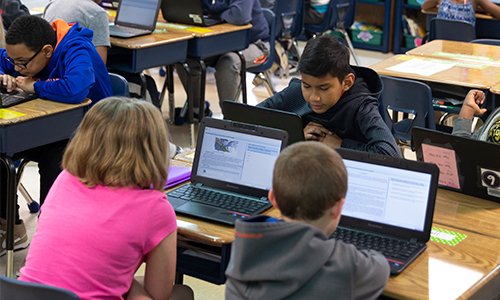School & test engagement
Educators need accurate assessment data to help students learn. But when students rapid-guess or otherwise disengage on tests the validity of scores can be affected. Our research examines the causes of test disengagement, how it relates to students’ overall academic engagement, and its impacts on individual test scores. We look at its effects on aggregated metrics used for school and teacher evaluations, achievement gap studies, and more. This research also explores better ways to measure and improve engagement and to help ensure that test scores more accurately reflect what students know and can do.


This study examines whether test effort differs by student subgroup, including by race and gender. The sensitivity of achievement gap estimates to any differences in test effort is also considered.
By: James Soland
Topics: Equity, School & test engagement


In this article, we examined the prevalence of rapid guessing to determine if this behavior varied by grade, subject, and teacher, and evaluated if rapid guessing influenced teacher value-added estimates. We observed differences in rapid guessing across grades, subjects, and teachers; however, this behavior did not appear to have a substantive effect on teacher value-added estimates.
By: Andrew Rice
Topics: School & test engagement, Student growth & accountability policies


“No fun games”: Engagement effects of two gameful assessment prototypes
This study examines the impact of two “gameful assessment” prototypes on student engagement and teacher perceptions among 391 Grades 3–7 students and 14 teachers in one Midwestern and one Northwestern school.
By: Meg Guerreiro, Chase Nordengren
Topics: School & test engagement, Innovations in reporting & assessment


Student test engagement and its impact on achievement gap estimates
In this Brookings Institute Chalkboard blog, James Soland shares his work investigating how student test engagement may shape achievement gaps.
By: James Soland
Topics: School & test engagement, Student growth & accountability policies


In this study we conducted a literature review to investigate whether assessment metadata (typically data relevant to how students behave on a test or survey) can provide information on SEL constructs. Implications of this new source of SEL data for practice, policy, and research are discussed.
By: James Soland, Gema Zamarro, Albert Cheng, Collin Hitt
Topics: School & test engagement, Innovations in reporting & assessment, Social-emotional learning


The impact of proctor notification when students disengage
How do you help make sure students give their best effort on testing day? New research on student test engagement shows how proctor notification can make a significant impact.
By: Steven Wise, Megan Kuhfeld, James Soland
Topics: Measurement & scaling, Innovations in reporting & assessment, School & test engagement


What happens when test takers disengage? Understanding and addressing rapid guessing
How does rapid-guessing differ from solution behavior? Research provides insight into test disengagement and how disengagement should be managed in scoring.
By: Steven Wise, Megan Kuhfeld


